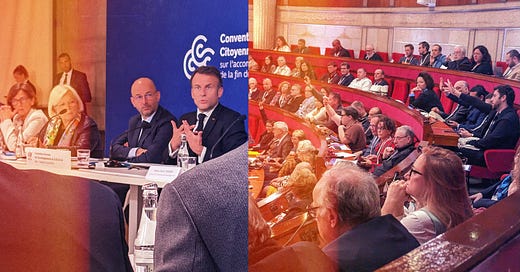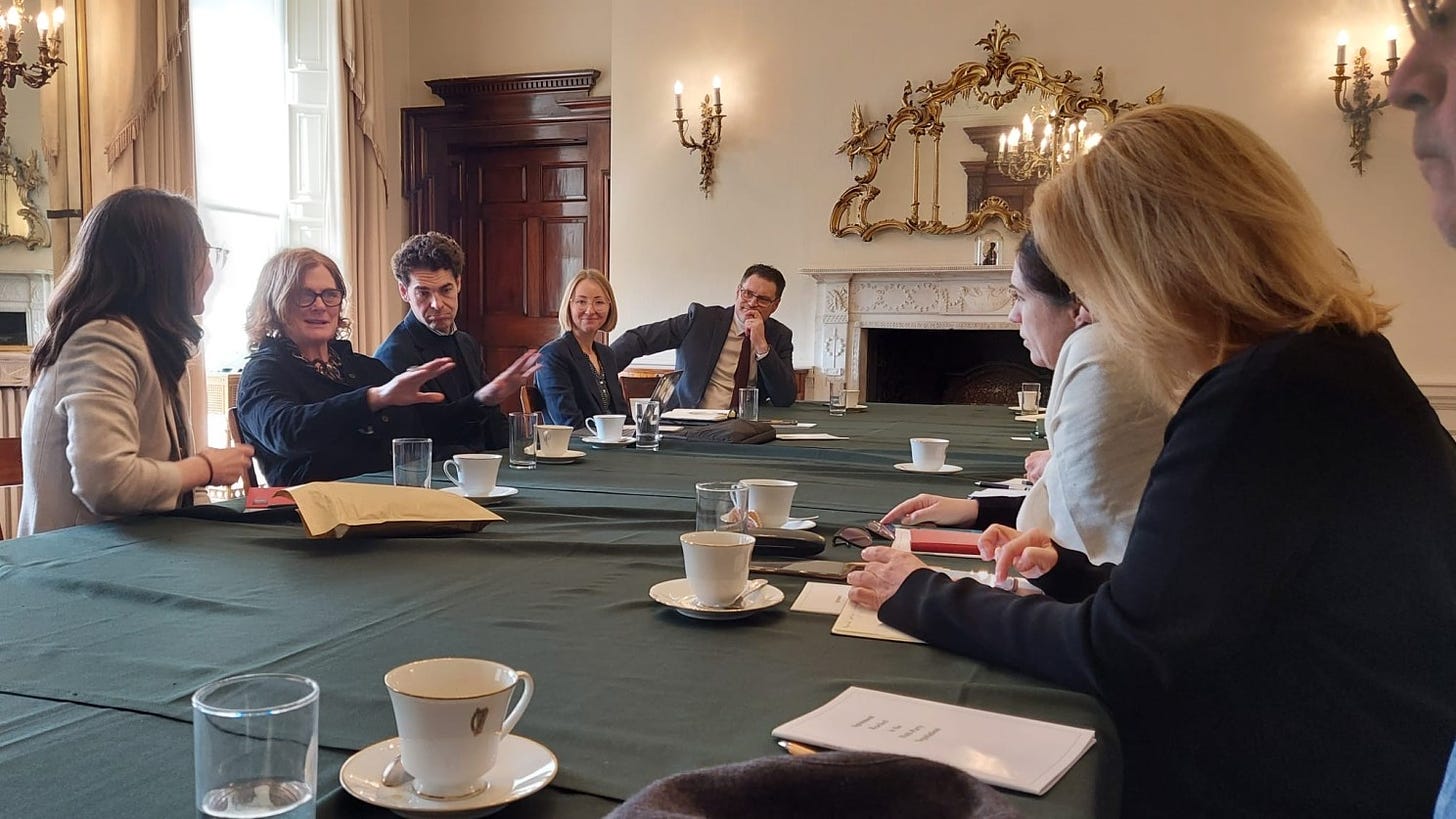🇫🇷 Macron praises French Assembly on end-of-life
The French president promises to organise another national Citizens' Assembly in 2024
In a meeting on April 26 with 140 Members of France’s latest national Citizens’ Assembly, French President Emmanuel Macron said the Assembly’s recommendations on legalising assisted dying and palliative care have been incorporated into draft legislation that will be debated soon in parliament.
Macron praised the Assembly for cutting through the divisiveness of social media and promised to hold another Assembly, on a new topic, before the end of the year.
Our International Advisory Council member and Yale professor Hélène Landemore live-reported from the scene in Paris. We can’t embed the tweets due to technical issues between Substack and X/Twitter, so we’ll do our best to summarise below:
First, Macron thanked the citizens for their work and pledged to present their 67 recommendations—which the Assembly approved by a stunning majority of 92%—to Parliament for consideration in one consolidated bill.
Unlike the previous French Citizens’ Assembly on Climate, the citizens’ recommendations are being passed on to parliament with greater transparency.
Macron discussed this point of tension between parliamentary and deliberative democracy.
“What you did is not a survey,” Macron said to the Members, as reported by Le Monde. “You have made a choice as a citizen to train, to debate, to learn in a loyal and transparent organized framework. What emerges from your debates is the expression of an informed opinion which binds us. And which, if we do not follow you, [forces us] to explain to you why.”
Citizens posed questions to the French President, including this important one: Could future Assemblies be initiated by citizens?
Macron said he’s convinced that deliberative democracy can help glue representative democracy back together. He said Assemblies help to build a “common framework of reference” for public debate to go beyond the “tyranny of emotions” and social media.
Macron welcomed the idea of citizen-initiated Assemblies, but believes we should focus for now on government-initiated ones, possibly in response to citizen petitions.
Finally, Macron promised to reconvene the Assembly Members one more time after their recommendations become law, giving them the chance to gather together again. This earned big applause.
In a follow-up meeting with the French Minister for Democratic Renewal Prisca Thevenot, one Assembly Member said she loved being able to become engaged civically — without having to enter the “political arena” to “fight” or “win” or engage in “oratory” games.
This is exactly the power of deliberative Citizens’ Assemblies! Politics doesn’t always have to be a fight. When they’re done the right way, Assemblies can take the sting and cynicism out of political decision-making — breaking from the norm of what Amanda Ripley calls “high conflict.”
Thevenot said the government is exploring something akin to “civic leave” to officially give citizens time off from work to attend Assemblies. Paid civic leave is one of the recommendations in the OECD policy paper on institutionalising deliberative democracy written by our Founder/CEO Claudia Chwalisz in 2021, which we continue to fully support at DemocracyNext.
🤝 Our Founding Head of Research and Learning Ieva Česnulaitytė just returned from a trip to Northern Ireland. Ieva shared her reflections on how deliberative practices could be adapted to a post-conflict environment:
Here are a few thoughts on democracy that crystallised from talking to the people living there and listening to colleagues’ reflections about the former Yugoslavia and Central and Eastern Europe.
As Robbie Stamp would say, how do we nudge the dial to the more constructive aspects of humanity away from destructive?
Northern Ireland and Yugoslavian experiences have much in common - and they bring a wealth of lessons about democracy and human nature. So much peace building and reconciliation and care work is done by women and NGOs and remains largely unrecognised, however essential. Care, mending, grieving is critically undervalued, but is as crucial as mycelium to a thriving forest.
…
Deliberative spaces can have some of the elements that create conditions for mending the broken societal fabric. Inspiration can be drawn from Jane Suiter’s thinking systemically about Citizens’ Assemblies in Northern Ireland (https://tinyurl.com/3uce6zr9) and Jamie Pow’s experimenting with citizen deliberation on cross-cutting issues in NI that can bring polarised societies together (https://tinyurl.com/2axzbp6e).
Read the full text at LinkedIn.
Other news and upcoming events:
🎧 Our Founder/CEO Claudia Chwalisz joined Monocle Magazine’s podcast to speak about our Six Ways to Democratise City Planning paper! Listen here.
🎨 The “All in! Re-designing Democracy” exhibition is opening at the National Art Gallery of Germany (Bundeskunsthalle) on May 29th. It follows on the Citizens’ Assembly on Democratising the Museum they held in November 2023. Read more about it here.
We’re also excited to see other cultural institutions establishing Citizens’ Assemblies to inform their work. In the UK, New Arts Exchange is launching a permanent Citizen Assembly to be part of its core leadership structure. Twelve thousand residents in the vicinity of Hyson Green in Nottingham will soon begin receiving invitation letters, sent out by our friends at the Sortition Foundation, to participate in a 40-person Assembly which will meet in May.
📚 We’re beginning a collaboration with pioneering Irish political scientist David Farrell: DemocracyNext and the University College Dublin (UCD) School of Politics and International Relations are partnering to bring together deliberative democracy practitioners and academics to publish an edited volume on the models and lessons of embedded Citizens' Assemblies.
📅 Interested in the intersection between democracy and technology? Claudia Chwalisz will be speaking at the Harvard Berkman Klein Center on 8 May with Professor Larry Lessig and Manon Revel. Register here to attend in-person or online. Claudia will be in Boston, Toronto, DC, and Dallas these next two weeks for various events and meetings with our American collaborators as we prepare to establish a stronger DemNext presence in the US. Watch this space!
Claudia will also be speaking at the University of Oxford Ethics in AI Workshop on 7 June: AI-enabled democracy and corporate democratization alongside Hélène Landemore and Joshua Cohen.






